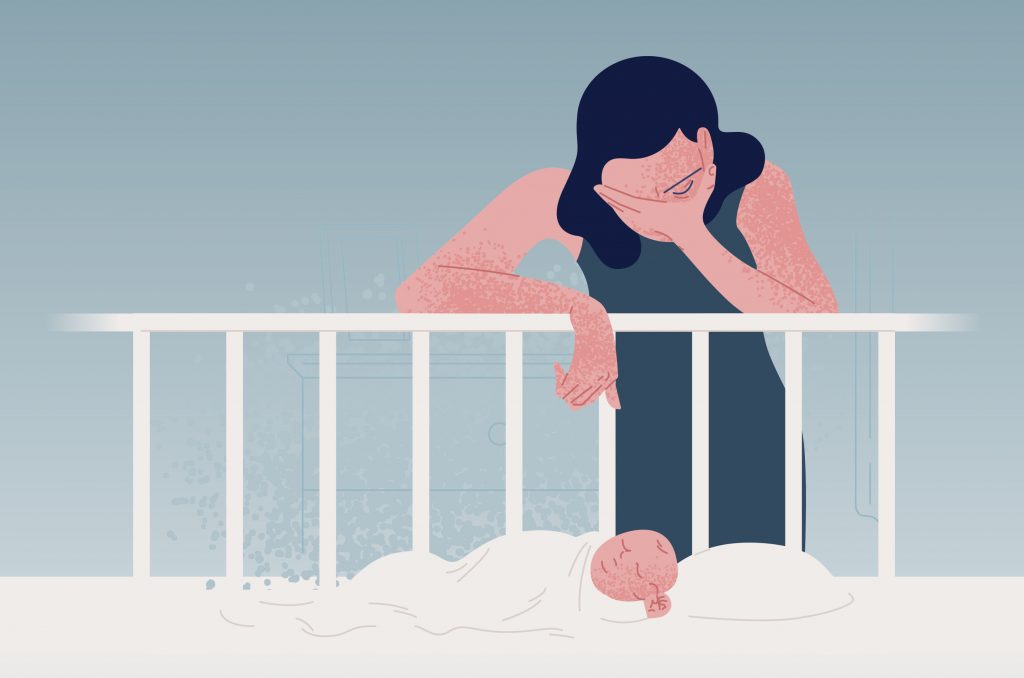When an infant joins your family, it’s natural to experience moments of joy, growth and discovery. But for some women, having a baby also introduces unexpected mental health struggles, known as postpartum depression, which can significantly affect a mother’s quality of life.
Postpartum depression can be mild to severe, taking a toll on both mental and physical health by causing a new mother to experience feelings of sadness and disconnection from her baby, according to the U.S. Department of Health and Human Services’ Office on Women’s Health. Symptoms vary and can include feelings of restlessness, hopelessness, low energy or motivation, memory problems, fatigue, withdrawal from friends and family, lack of interest or focus, disordered sleeping or eating, headaches, stomach problems, pain and harmful thoughts. Sudden changes in the body’s levels of estrogen and progesterone during and after pregnancy are likely the culprits behind postpartum depression, as well as thyroid hormone activity.
Women suffering from postpartum depression also may experience fears and concerns that aren’t normal for them, like a sense of being overwhelmed or inadequate, doubts about their ability to be a good mother, grief over the significant change in their lives, stress about normal routines and loss of confidence. Mothers may be at greater risk if they have had a history of certain mental health conditions, a lack of support from family and friends, difficulty breastfeeding, problems with earlier pregnancies, relationship or money difficulties, substance use or other issues.
It’s extremely important for women experiencing postpartum depression to consult a doctor and create a plan to address it. A less common but related condition known as postpartum psychosis—which usually develops in the first week after delivery and can include severe confusion, hallucination, rapid mood swings, thoughts of harm, paranoia, agitation and reckless behavior—is considered a medical emergency and must be treated immediately.
New mothers should consult a health care professional if:
- Feelings of sadness begin up to a year after childbirth and don’t subside after two weeks
- Depressive symptoms become more intense over time
- Normal activities are not as enjoyable as they used to be
- It’s difficult to observe normal schedules at home or work
- They feel unable to perform personal care routines like sleeping, eating and bathing
- They feel unable to care for the baby
- They have thoughts of harming themselves or the baby
Activities that can help women address the condition:
- Get a regular amount of rest. Try to sleep when the baby is sleeping.
- Ask others for help with daily activities to avoid feeling overwhelmed.
- Take time away from home to unwind or visit friends.
- Talk about post-birth feelings with sympathetic friends, relatives and other mothers with similar experiences.
- Take part in a support group recommended by a doctor or other health care professional.
- Don’t use alcohol or recreational drugs.
- If possible, try to avoid other major life changes like moving or changing jobs while dealing with postpartum depression.
What does an evaluation look like?
- Screening may include a questionnaire about feelings, symptoms and experiences.
- Blood tests can determine whether an underactive thyroid gland is a factor.
- Other tests may be conducted to rule out additional causes.
How is the condition treated?
- Individual psychotherapy is an important part of treatment. It can help new mothers come to terms with their feelings and experiences and set goals to solve problems.
- Antidepressant medication may be prescribed. Some antidepressants can be used safely during breastfeeding.
- Family or relationship therapy may be helpful as well.
- Experts emphasize that postpartum depression is not a character flaw or sign of weakness, and new mothers are encouraged not to feel shame or blame themselves for it. Postpartum depression is a recognized medical condition that requires treatment to ensure a return to a good quality of life.
Sources: HHS Office of Women’s Health, Mayo Clinic
